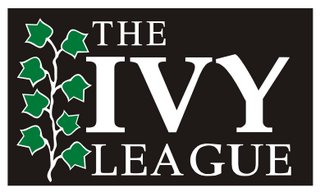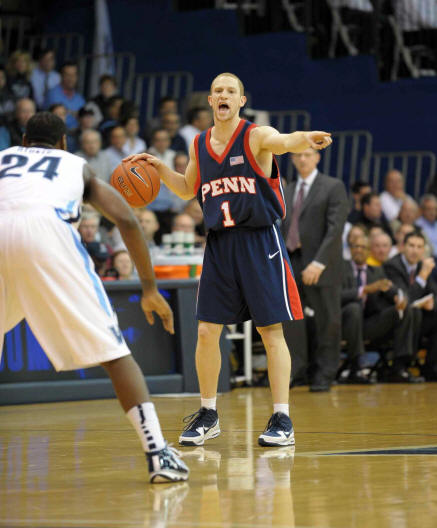RTC Conference Primers: #24 – Ivy League
Posted by Brian Goodman on October 11th, 2010Howard Hochman is the RTC correspondent for the Ivy League.
Predicted Order of Finish
Most publications and prognosticators see Princeton as the most obvious choice to win the conference crown. They base this on the fact that the Tigers return all of their key players – a group that took eventual champion Cornell down to the wire in both games last season. However, I believe the collection of sophomores up in Cambridge, even with leader Kyle Casey getting a late start due to injury, will improve dramatically and thus wear the crown come March. And for those of you unfamiliar with Ivy hoops, this is the one conference where being regular season champ really does matter, as there is no postseason conference tournament. Here is how I see it:
- Harvard (12-2)
- Princeton (11-3)
- Penn (10-4)
- Cornell (9-5)
- Yale (5-9)
- Brown (4-10)
- Columbia (3-11)
- Dartmouth (2-12)
All-Conference Team (key stats from last season in parentheses)
- Kyle Casey (F) – Harvard (10.4 PPG, 5.1 RPG)
- Doug Davis (G) – Princeton (12.7 PPG)
- Brandyn Curry (G) – Harvard ( 7.3 PPG, 3.5 APG)
- Christian Webster (G) – Harvard (8.8 PPG)
- Zack Rosen (G) – Penn (17.7 PPG, 4.5 APG)
6th Man
- Dan Mavraides (G) – Princeton (11.5 PPG, 4.3 RPG)
Impact Newcomer
In a league that does not offer athletic scholarships, ferreting out an incoming freshman that will have the greatest impact is not an easy task. After all, one does not find a lot of McDonald’s All-Americans on any of the Ivy rosters. Given that, we look to Ithaca where Cornell, under new coach Bill Courtney, looks to retool. And the freshman that could make the biggest splash is none other than Dwight Tarwater. This 6’6 forward from Knoxville, Tennessee, comes with some impressive credentials. He was a two-time all-state selection and as a senior was named Division II-A Mr. Basketball. His stats were equally impressive, averaging 23.2 points and 10.1 rebounds per game. He shot 61% from the field and 78% from the free-throw line.
Honorable mention in this category goes to the entire Yale class of 2014. This quintet is led by home-grown product 6’3 guard Isaiah Salafia, who was a McDonald’s nominee as a senior. Coach James Jones calls him his most athletic recruit with all the tools to become a star.
What You Need to Know
- New Men on Campus: There are four new coaches taking the reins this fall. Bill Courtney (Cornell) and Kyle Smith (Columbia) come with respected recruiting resumes. The former built the team at George Mason that went to the Final Four; the latter helped build the St.Mary’s program out west – that’s Australian for hoops, mate – that gave Gonzaga all they could handle the past Few years. Then there is Jerome Allen at Penn who had the interim tag removed over the summer. While this Quaker legend was a popular choice, it remains to be seen if he has enough game experience to lead the red and blue to what their fans believe is their rightful place on top of the standings. And finally, Paul Cormier returns to Dartmouth. He was at the helm when the Big Green competed, but a return to glory is not in the immediate future.
- Riding the Big Red Wave: The conference received an incredible amount of ink and respect during the Cornell run to the Sweet 16 last March. It is going to be a number of years before the impact is truly realized. Certainly the recruiting classes around the league, especially those of Penn, Princeton, Harvard, and of course, Cornell, are among the best in school history. And there are some ESPN Top 100 recruits who have listed the Ivies among their choices and have even made official visits. One has to wonder if the time will ever come again when an Ivy team will actually go the Final Four a la Penn in 1979.
- No Room at the Top: In all of the major conferences, as well as some of the mid-majors, a top-heavy conference can result in some head-to-head battles, which while definitely exciting, can be meaningless in the big picture. After all, the fourth place finishers in all of the BCS conferences are all but guaranteed an invite to the Big Dance. Not so in the Ivy League, where only first place matters in the scheme of the Big Dance. This year, there are four legitimate contenders. The clear favorites are Harvard and Princeton; Harvard with a talented sophomore class and the latter with a stellar returning nucleus. But not far behind are Cornell, with a solid group of newbies and a fistful of players who got playing time, albeit limited, last season behind four all-conference seniors; and Penn, with the league’s best player, Zack Rosen.
Predicted Champion
- Harvard (NCAA #14 Seed). The Crimson fielded a third-place team last season, but the show that Jeremy Lin put on in the NBA Summer League when matched up against John Wall legitimized the school’s talent. Lin may be gone, but a talented core led by Kyle Casey, Keith Wright and the smooth-shooting Christian Webster should be a force. The big questions are whether Harvard can survive a dearth of size (Casey led the team in rebounds with an unflattering 5.1 RPG) and how they’ll fare when the pressure rises in the conference season.
Top Contenders
- Princeton: The Tigers return their top two scorers in Dan Mavraides and Doug Davis. Nonconference games include a home date against Rutgers and an unenviable trip to Durham to take on Duke (plus games against St. Joseph’s and Tulsa), which will help knock Princeton into shape come conference play.
- Penn: It’s not often where a first-year head coach can field a contending team, but Jerome Allen has the not-so-secret weapon of Zack Rosen. If he continues to improve, there is no doubt he will receive national recognition following in the not-too distant footsteps of Ibbi Jabbar. As talented as Rosen is, his supporting cast couldn’t keep the Quakers from going 6-22, including a rough 1-13 nonconference mark. Penn will also get a taste of what it’s like to be a Big East team, with trips against contenders Villanova and Pitt.
RPI Boosters
For the Ivy League, a nice RPI is just an added bonus and an impressive performance ( i.e., Cornell vs. Kansas last year) can open some eyes and might help in getting a nice seed in March, but that’s about all. After all, only one team will go to the tournament. That being said, there are some juicy match-ups for students, fans, and alums to look forward to. Here they are:
- Nov. 14 – Princeton at Duke, Cornell at Seton Hall
- Nov. 30 – Cornell at Syracuse
- Dec. 4 – Harvard at Michigan (a triumphant return for coach Tommy Amaker?)
- Dec. 22 – Harvard vs. Uconn
- Dec. 27 – Penn at Pitt
- Jan. 3 – Penn at Kentucky
Key Conference Games
The recipe for success this season will be to beat up on the four have-nots, win your home games against the other contenders and steal one or two on the road. The eventual champion will be the team that can follow the recipe. Any of the matchups between two contenders are particularly meaningful.
- Feb. 4 – Harvard at Princeton
- Feb. 5 – Harvard at Penn – The Quakers get a nice break with four straight conference home games in the early going.
- Feb. 11 – Cornell vs. Penn
- Feb. 12 – Cornell vs. Princeton
- Feb. 18 – Cornell vs. Harvard – the final in a three-game stretch for the Big Red that could very well decide their fate.
NCAA Tournament History
The Ivy League has an all-time record of 40-74 (.351) in the NCAA Tournament, though only nine of those wins have come in the last three decades. Cornell‘s run to the Sweet Sixteen last season, though, showed the nation that the Ivy League should not be taken lightly.
Final Thoughts
The good news is that the conference champion, whoever it may turn out to be, will no doubt get a seeding boost in March thanks to Cornell’s success last year. That will help, since the four contenders play a demanding non-conference schedule ( see Penn vs. Big 5) and could beat up on each other. It’s very possible that the conference champion will finish around .500. Normally, that would scream “play-in game,” but I’ll give the Ivy League a little more credit. Nevertheless, each of the top four teams, whether it is Penn led by stardom-bound Zach Rosen, or Cornell and its tournament experience, or Princeton and their returning vets, or Harvard with its outstanding sophomore class, will represent itself admirably on the Road to the Final Four.














































